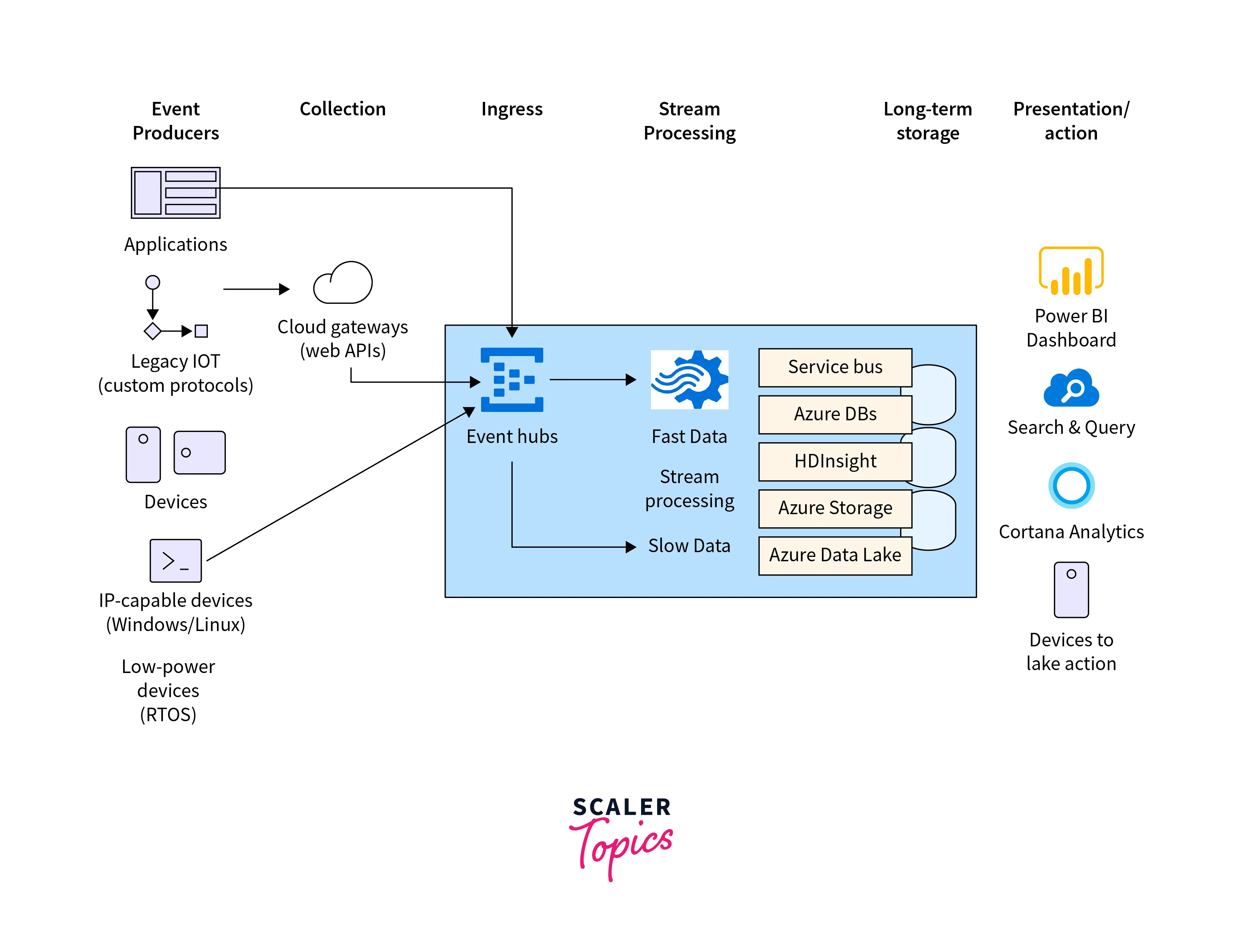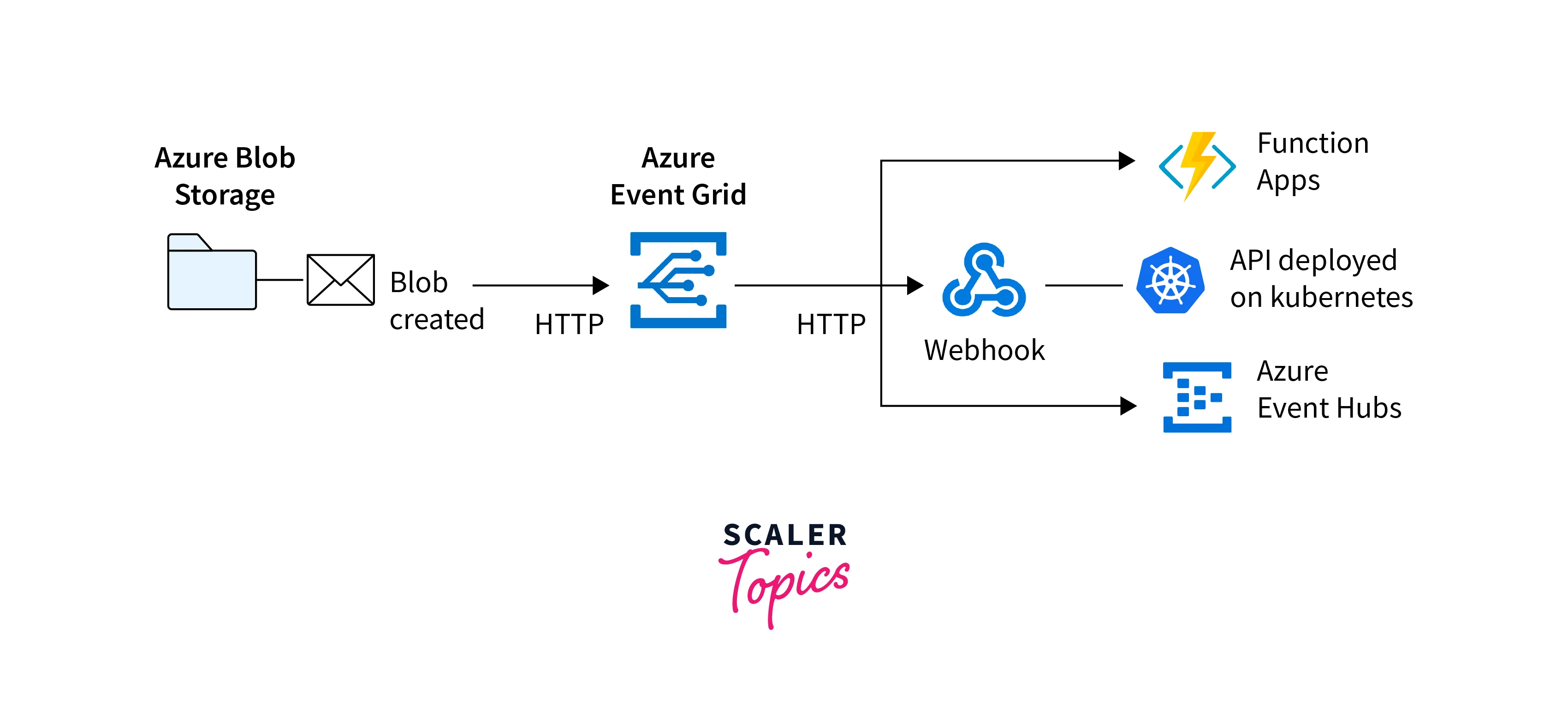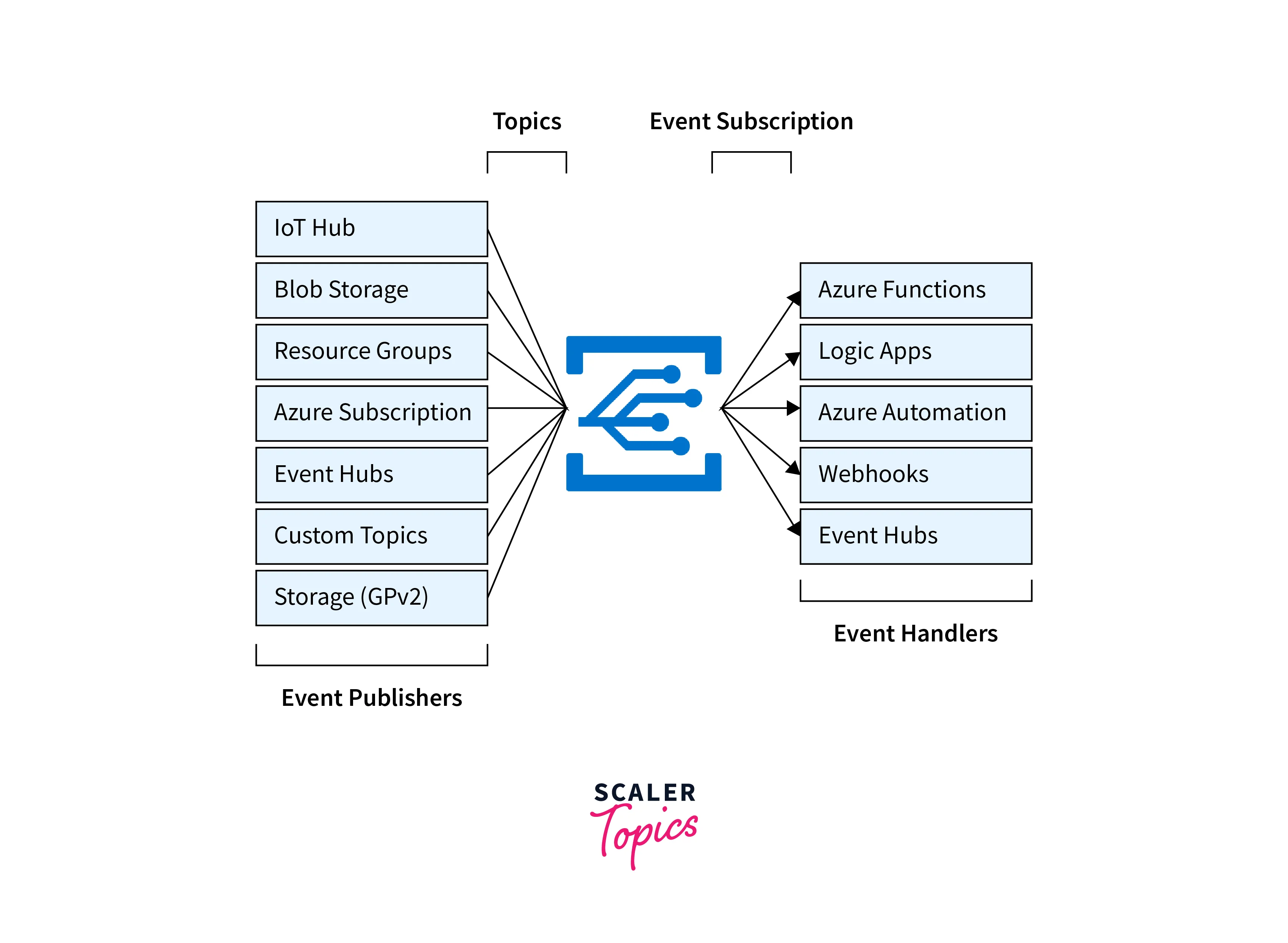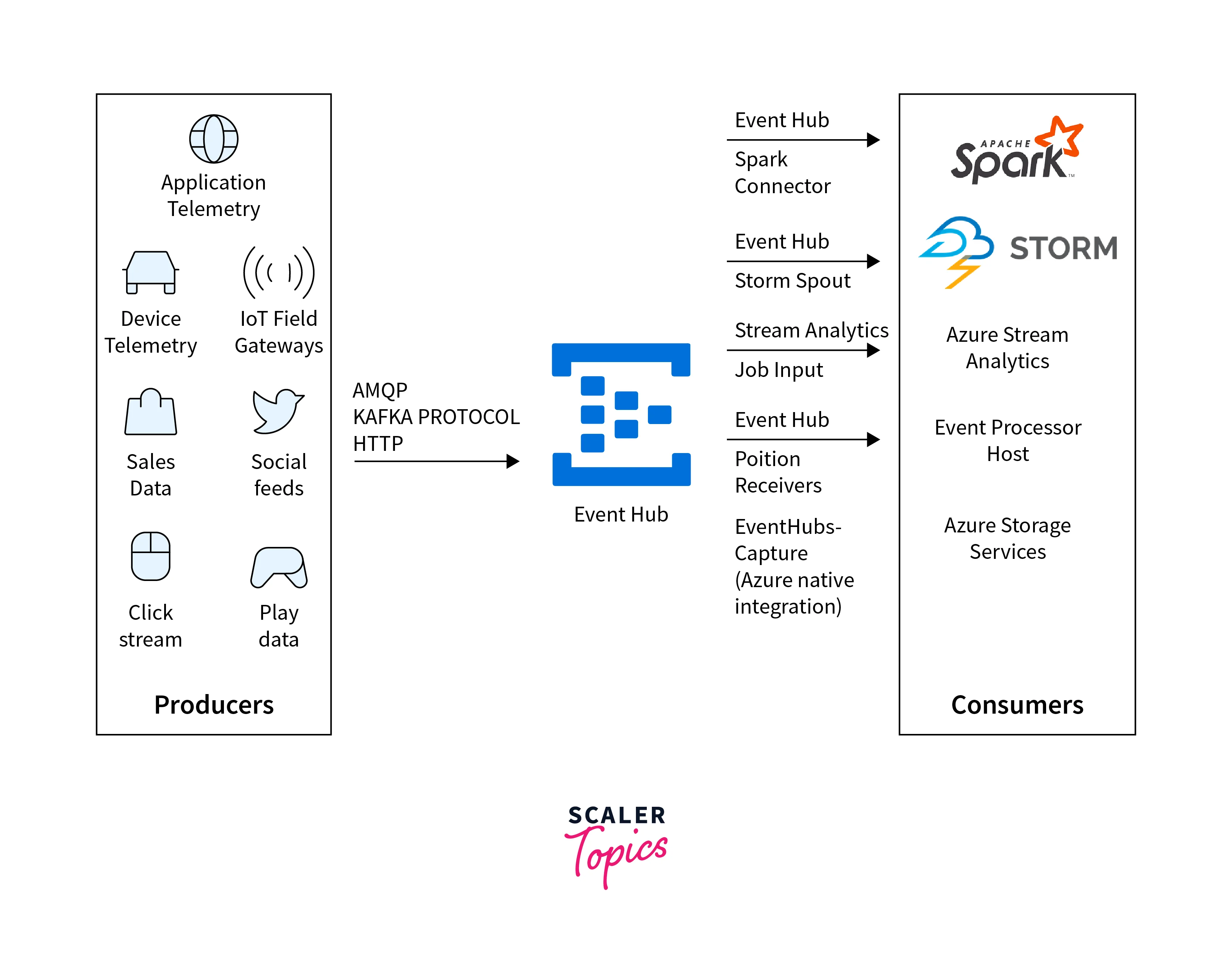Azure Event Hub vs Event Grid
Overview
Azure Event Hub is a real-time data streaming platform that ingests, processes, and stores massive amounts of data from various sources, providing event-driven architecture for big data and analytics. It's ideal for telemetry and IoT scenarios. Azure Event Grid, on the other hand, is an event-routing service that simplifies event-driven application development. It routes events from various Azure services to endpoints like functions or webhooks, enabling event-driven, serverless, and reactive application designs. Event Hub focuses on data streaming and ingestion, while Event Grid specializes in event routing and processing for building responsive applications.
Events in Azure
Events in Azure refer to notifications or triggers that signify specific occurrences within Azure resources or applications. These events are integral to building responsive, real-time, and event-driven systems. Azure provides various services to manage and process events.
Azure Event Grid is a fully managed event routing service provided by Microsoft Azure, offering a streamlined approach to building event-driven applications. With Azure Event Grid, organizations can effortlessly react to events originating from a wide array of sources, including various Azure services, custom applications, and external sources, ensuring scalable and reliable event processing.
One of the central components of Azure Event Grid is its capability to serve as an event broker for numerous event sources. This service seamlessly ingests events generated by Azure services like Azure Blob Storage, Azure Functions, and Azure IoT Hub, as well as custom events from user-developed applications. Events can encompass a broad spectrum of activities, ranging from a new file upload in a storage container to sensor data readings in an IoT network or user interactions in a web application.
Event routing is a key feature of Azure Event Grid. It enables users to specify how events are delivered to their intended destinations. By setting up event subscriptions, users can route events to Azure Functions, Logic Apps, Event Hubs, Service Bus, and more. This versatile routing system ensures that events reach the appropriate components within an application, allowing for seamless integration and action upon incoming events.
Scalability is another major advantage of Azure Event Grid. The service is designed to handle high volumes of events and can automatically scale to accommodate growing workloads. This feature is particularly beneficial for use cases involving fluctuating event rates, such as IoT applications and real-time analytics, where the ability to cope with variable loads is essential.
Azure Event Grid offers fine-grained event filtering capabilities. Users can filter events based on event types or custom attributes, allowing for precise event subscriptions. This means that only events relevant to a particular application or use case will be processed, reducing unnecessary overhead and improving overall system efficiency.
The service is built with a strong emphasis on reliability. It incorporates redundancy and regional failover to ensure event delivery even in the face of infrastructure failures. This level of reliability is crucial for mission-critical applications that depend on consistent and uninterrupted event processing.
Security is paramount with Azure Event Grid, featuring event validation and integration with Azure Active Directory to ensure that only authorized entities can publish and subscribe to events. This robust security framework protects event-driven applications from unauthorized access, providing peace of mind for developers and organizations.
Monitoring and diagnostics are made simple with Azure Event Grid, offering extensive capabilities for tracking event delivery, viewing metrics, and configuring alerts to promptly address any issues or anomalies in the event-driven architecture.
Finally, Azure Event Grid adopts a consumption-based pricing model, where users pay only for the resources they consume. The service provides a generous amount of free monthly operations and offers various pricing tiers to accommodate applications of different scales and complexities.
What is Event Grid and Event Hub in Azure?
Azure Event Hub:

Azure Event Hub is a cloud-based, scalable, and real-time data streaming platform provided by Microsoft Azure. Its primary purpose is to ingest, process, and store large volumes of data generated by diverse sources, making it an ideal choice for scenarios such as telemetry, log aggregation, IoT (Internet of Things) data, and more. Event Hub is designed to handle high-throughput, low-latency data streams, making it a powerful tool for applications that require real-time data processing and analytics.
At its core, Azure Event Hub operates as a distributed publish-subscribe system, where event producers (the senders of data) publish events to the hub, and event consumers (the receivers of data) subscribe to specific partitions within the hub to process these events. Event producers can include devices, applications, or any data source that generates events, while consumers can be applications, analytics platforms, or other services that need to process the incoming data.
Key features of Azure Event Hub include:
- Scalability: Event Hub can dynamically scale to accommodate varying workloads, ensuring that it can handle high volumes of incoming data without a hitch.
- Low Latency: It provides low-latency event ingestion and delivery, ensuring that events are processed in near real-time.
- Partitioning: Event Hub uses partitioning to parallelize event processing, enabling efficient horizontal scaling and distribution of data across multiple consumers.
- Retention: Event Hub allows you to configure data retention policies, ensuring that you can store data for the required duration, whether it's hours, days, or even weeks.
- Integration: It seamlessly integrates with other Azure services like Azure Functions, Azure Stream Analytics, and Azure Logic Apps, as well as third-party services, for event processing.
- Security: Azure Event Hub offers robust security features, including Azure Active Directory integration, encryption at rest and in transit, and network security policies.
Azure Event Grid:

Azure Event Grid, on the other hand, is a fully managed event routing service that simplifies the development of event-driven applications. It acts as an event broker, capturing events from various Azure services and routing them to event handlers, which can be Azure Functions, webhooks, or custom applications. Event Grid is all about enabling a reactive and serverless architecture, ensuring that events trigger actions in a highly responsive manner.
Key features of Azure Event Grid include:
- Event Sources: Azure Event Grid supports numerous Azure services as event sources, including Azure Blob Storage, Azure IoT Hub, Azure Functions, and more. This means it can capture events from various parts of your Azure infrastructure.
- Event Routing: Events are automatically routed to event handlers based on event subscriptions, ensuring that the right actions are triggered when specific events occur.
- Serverless: Event Grid enables serverless event processing, meaning you don't need to manage infrastructure. It scales automatically and charges you based on actual usage.
- Custom Events: You can also send custom events to Event Grid, allowing you to integrate external systems and applications with your event-driven architecture.
- Filtering: Event Grid supports event filtering, allowing you to subscribe to specific types of events and filter them based on event data content, subject, or other attributes.
- Security: Event Grid offers security features like role-based access control (RBAC) and Azure Active Directory integration to control access to event subscriptions.
Difference between event grid and event hub
| Aspect | Azure Event Grid | Azure Event Hubs |
|---|---|---|
| Use Case | Event routing, serverless event processing | Real-time event ingestion, data streaming |
| Event Sources | Azure services, custom sources | Custom applications, IoT, telemetry |
| Event Delivery | Event-driven, pub/sub model | Stream-based, message queues |
| Event Schema | Lightweight event metadata | Custom payloads, structured or unstructured data |
| Scale | High throughput for lightweight events | Very high throughput for data streaming |
| Event Filtering | Supports filtering based on event type and subject | Limited filtering, requires consumer code |
| Ordering | No guaranteed ordering of events | Guaranteed event ordering within a partition |
| Retention | Short retention for recent events | Configurable retention, supports replay |
| Pricing | Pay per operation and outbound bandwidth | Pay for ingress and egress data, and throughput |
Now, let's provide a more detailed explanation for each of the aspects covered in the table.
Primary Purpose:
- Azure Event Grid: The primary purpose of Azure Event Grid is event routing. It is designed to capture events from various Azure services and deliver them to specific event handlers or endpoints. This capability makes it an excellent choice for building responsive, event-driven applications where you need to respond to events as they occur. Event Grid acts as an event broker, ensuring that events reach their intended destinations, which can be Azure Functions, webhooks, or custom applications.
- Azure Event Hub: Azure Event Hub, on the other hand, is primarily designed for data streaming. While it can handle events, its primary focus is on ingesting, processing, and storing large volumes of data generated by diverse sources in real-time. This makes it particularly well-suited for scenarios like telemetry and IoT data, where high-throughput, low-latency data processing is critical.
Event Source Variety:
- Azure Event Grid: Azure Event Grid supports a wide variety of Azure services as event sources. These services include Azure Blob Storage, Azure Functions, Azure IoT Hub, Azure App Service, and more. The diversity of event sources makes Event Grid a versatile choice for aggregating events generated across your Azure infrastructure, regardless of the source.
- Azure Event Hub: While Azure Event Hub can handle events, it is primarily focused on data streams. It may not be as diverse in terms of event sources as Azure Event Grid. Instead, it excels at ingesting and processing large data streams, making it ideal for high-throughput scenarios where data volume and velocity are substantial.
Latency:
- Azure Event Grid: Azure Event Grid offers low-latency event delivery. It is designed for real-time responsiveness, ensuring that events are typically routed almost immediately upon their occurrence. This low-latency event processing makes it ideal for applications that require immediate action based on events, such as user interactions or system events.
- Azure Event Hub: Azure Event Hub is optimized for low-latency data ingestion. Low-latency data ingestion is essential for real-time data processing. It ensures that data is ingested and processed with minimal delay, which is crucial for scenarios like telemetry and IoT data processing where timely insights are valuable.
Serverless Operation:
- Azure Event Grid: Azure Event Grid operates in a serverless manner. This means that you don't need to manage the underlying infrastructure. It can scale automatically based on the number of incoming events, which makes it a cost-effective choice, particularly for applications with varying workloads. Serverless operation is beneficial for scenarios where you want to focus on the application logic and not worry about infrastructure management.
- Azure Event Hub: While Azure Event Hub is not inherently serverless, it can be used effectively in serverless architectures when integrated with other Azure services. It provides the flexibility to work in various scenarios, from traditional infrastructure to serverless environments, depending on your specific use case. This versatility allows you to tailor its operation to your application's requirements.
Custom Events:
- Azure Event Grid: Azure Event Grid supports custom events. This means you can send events to it, making it a versatile choice for integrating external systems and applications with your event-driven architecture. Custom events enable you to extend the usage of Event Grid beyond Azure-native services to a wide range of use cases.
- Azure Event Hub: Azure Event Hub is more focused on data streams, but it has the capability to handle custom events. However, its primary strength lies in processing large volumes of data efficiently. This makes it ideal for telemetry and IoT scenarios, as well as other real-time data processing needs. While it can handle custom events, its primary focus is on data ingestion.
Event Filtering:
- Azure Event Grid: Event Grid provides support for event filtering. This enables you to subscribe to specific types of events and filter them based on various attributes, such as content, subject, and more. Event filtering gives you fine-grained control over event handling, allowing you to tailor the handling of events to suit your application's needs precisely.
- Azure Event Hub: While Azure Event Hub is not specifically tailored for event filtering in the same way Event Grid is, it does allow you to filter data based on partition key and consumer groups. However, its primary focus is on data streams, and it may not offer the same level of event-specific filtering as Event Grid. Event Hub's filtering capabilities are more centered around managing data streams efficiently.
Security:
- Azure Event Grid: Azure Event Grid offers robust security features. It includes role-based access control (RBAC), which allows you to control access to event subscriptions. Additionally, Event Grid supports integration with Azure Active Directory, which further enhances security and access control. Encryption at rest and in transit ensures the privacy and integrity of your event data.
- Azure Event Hub: Azure Event Hub also provides strong security features. These include Azure Active Directory integration, ensuring secure access to the service. Encryption at rest and in transit is another critical security feature, safeguarding your data as it is ingested, processed, and stored within Event Hub.
Use Cases:
- Azure Event Grid: Azure Event Grid is well-suited for a wide range of use cases that require real-time event processing and routing. It is commonly used for building reactive, serverless applications where actions are triggered in response to specific events. For example, it can be used to handle user interactions, such as processing notifications or responding to resource changes within Azure services.
- Azure Event Hub: Azure Event Hub shines in use cases where high-throughput, low-latency data ingestion and processing are essential. It is particularly well-suited for scenarios involving telemetry, log aggregation, and IoT data processing. In these use cases, real-time data processing is crucial for deriving insights from large volumes of data generated by various sources.
Integration:
- Azure Event Grid: Azure Event Grid seamlessly integrates with various Azure services, allowing you to connect it with services like Azure Functions, Azure Logic Apps, Azure Automation, and more. This integration extends its usability to a wide range of scenarios. It also supports third-party integrations through webhooks, making it a versatile choice for building event-driven applications that involve external systems and services.
- Azure Event Hub: Azure Event Hub integrates effectively with Azure Stream Analytics, Azure Functions, and Azure Logic Apps. These integrations make it a valuable component in real-time data processing pipelines. While its primary focus is on data streams, these integrations extend its usability to a variety of scenarios. For example, you can use it to ingest and process data from IoT devices, allowing you to derive insights and trigger actions based on real-time data.
When to use them
When to Use Azure Event Grid:
Azure Event Grid is a versatile service suitable for a variety of scenarios. It excels in event-driven architectures, where real-time responsiveness is crucial, making it ideal for IoT data processing, real-time analytics, and serverless applications. Event Grid also facilitates the decoupling of components, reducing dependencies within your architecture and increasing system flexibility.
Azure Event Grid seamlessly integrates with Azure services, allowing you to respond to changes in Azure resources, which is particularly valuable for scenarios involving Azure Blob Storage, VM state changes, and other Azure services. Furthermore, it accommodates custom applications, enabling you to coordinate actions within your application and interact with external systems through event-driven communication.
Scalability is a significant advantage, making it suitable for situations with varying event rates, such as IoT applications. Additionally, fine-grained event filtering and routing options improve efficiency by directing specific events to designated destinations based on their attributes.

- Event-Driven Applications: Azure Event Grid is best for building event-driven applications.
- Real-Time Processing: It excels at real-time event processing and low-latency event delivery.
- Serverless Integration: Ideal for serverless architectures with seamless integration into Azure Functions and Logic Apps.
- Azure Service Integration: Supports various Azure services as event sources.
- Lightweight Event Metadata: Particularly efficient for handling lightweight event metadata.
- Event Filtering: Allows you to filter events based on type and subject.
- Cost-Efficient: Offers cost-effective pricing for high event volume scenarios.
- Publish-Subscribe Model: Utilizes a publish-subscribe model for event distribution.
When to Use Azure Event Hub:

- IoT Telemetry and Data Ingestion: Ideal for handling data from IoT devices at scale.
- Log and Event Processing: Efficient for processing logs and real-time events.
- Data Streaming for Analytics: Used as a data pipeline for real-time analytics.
- High-Throughput Scenarios: Suitable for handling large volumes of data.
- Ordered Event Delivery: Guarantees the order of events within a partition.
- Data Retention and Replay: Supports configurable data retention for replay and batch processing.
- Custom Payloads: Allows structured or unstructured data payloads.
- Complex Event Processing: Supports advanced event processing and filtering.
- Durable Data Ingestion: Provides durability and reliability for data ingestion.
- Integration with Big Data Services: Integrates well with Azure big data services for large-scale data processing.
Conclusion
- Azure Event Grid is an event routing service designed for real-time event processing and routing within Azure services, providing low-latency event delivery.
- Azure Event Hub is primarily a data streaming service built for high-throughput, low-latency data ingestion and processing, making it ideal for telemetry and IoT scenarios.
- Event Grid is serverless, automatically scaling based on event load, which makes it cost-effective and suitable for serverless architectures.
- Event Hub can be used in serverless architectures but is not inherently serverless, offering flexibility to work in various scenarios.
- Event Grid is well-suited for user interactions, resource changes, and custom events, allowing the integration of external systems.
- Event Hub is optimized for high-throughput scenarios, especially in telemetry and IoT data processing, where low-latency data processing is crucial.
